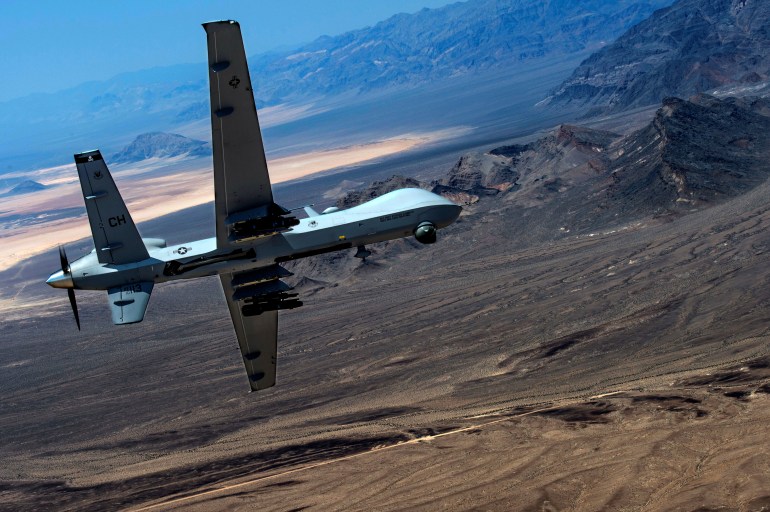US Congress to vote on F-35 sale to UAE: Republican senator
Senator Roy Blunt, a top Trump ally, predicts Congress will not block F-35 sale to Gulf state in a vote this month.

A leading Republican ally of President Donald Trump has predicted the United States Congress will not block the sale of advanced F-35 fights jets and Reaper drones to the United Arab Emirates.
Senator Roy Blunt, who chairs the Senate Republican Policy Committee, told reporters at the US Capitol there would be votes in Congress on the $23bn arms sale to the UAE.
Keep reading
list of 3 itemsPompeo to visit UAE to discuss arms sale, Israel normalisation
US senators seek to halt Trump’s $23bn UAE arms sale
“That will come up. It will not successfully be stopped by the Congress, I don’t believe. But it’s a debate that we ought to be thinking about,” Blunt said after a weekly caucus meeting of Senate Republicans on Tuesday.
“My personal view is, it would be a big mistake not to move forward with that arms sale,” Blunt said, outlining the Republican argument in favour of the transfer.

A bipartisan group of senators introduced four resolutions on November 19 intended to halt the Trump administration’s planned sale of high-tech fighter jets, drones and air-to-air missiles to the UAE.
Senators Bob Menendez and Chris Murphy, both Democrats, joined with Republican Rand Paul to sponsor four separate measures blocking the proposed sale under the US’s Arms Control Act, which gives Congress expedited procedures for reviewing and rejecting foreign arms sales.
The proposed sale is a “massive infusion of weapons to a country in a volatile region with multiple ongoing conflicts” that “is downright irresponsible”, Senator Menendez said in a statement at the time.
The weapons sale was agreed to by the Trump administration with the UAE in a side deal to the “Abraham Accords” reached in September that normalised official ties between Israel, the UAE and the Gulf Arab state of Bahrain.

Israeli leaders Prime Minister Benjamin Netanyahu and Defence Minister Benny Gantz said on October 23 Israel would not oppose the weapons sale given assurances its military advantage would be maintained, Blunt noted.
“Israel is supportive. I think it may be the only thing that Netanyahu and Gantz have agreed on since they formed their coalition government, that this sale should go forward,” Blunt said.
“For 20 years now, three different administrations, we have increasingly worked closely with the UAE on defence issues. On the ground together, in the air together, in at least six different extended deployments, the UAE has been there,” Blunt said.
“Clearly, the Abraham accords, what’s happening with Bahrain following – and I think others to follow that – will be impacted by whether we continue to have the kind of cooperation on defence issues that we’ve had with the UAE,” he said.
Opponents of the arms sale, however, have cited the UAE’s involvement in the conflict in Yemen, where a Saudi-led coalition has been at war with the Houthi movement since 2015. Tens of thousands of people have been killed in the conflict, which has led to what the United Nations has called the world’s worst humanitarian crisis. The UAE withdrew from that campaign in 2019 to focus its military on tensions with Iran, but it remains engaged in the conflict indirectly via several proxies and allies on the ground.
A coalition of rights groups in the US has opposed the sale.
Trump officials briefed members of the Senate behind closed doors on terms of the sale on November 30. Afterwards, Senator Murphy tweeted there were many unanswered questions.
Just left the classified briefing on the proposed massive, unprecedented arms sale to UAE, including F-35s and Reaper drones.
Just a mind blowing number of unsettled issues and questions the Administration couldn’t answer. Hard to overstate the danger of rushing this though.
— Chris Murphy (@ChrisMurphyCT) December 1, 2020
In its formal notification to Congress, the Trump administration had advised the sales would result in a “significant increase” in the UAE’s capability and would “alter the regional military balance”.
Both the House of Representatives and the Senate would have to pass the resolutions seeking to block the sale by two-thirds majorities in order to overcome a likely veto by President Trump.